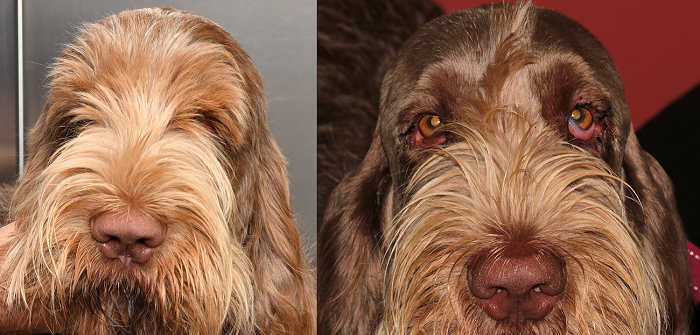Complex surgery corrects canine’s multiple eye conditions
Team of ophthalmologists shorten and repair inward turning eyelids and remove excess skin to improve dog’s sight.
Veterinary specialists from the Royal (Dick) School of Veterinary Studies’ Hospital for Small Animals have saved the sight of a dog with severe eye conditions.
A team of ophthalmologists performed complex surgical procedures to correct multiple issues. The dog’s eyesight dramatically improved following surgery and it is now happy, confident and pain free.
Painful condition

Nico, a two-year-old Italian Spinone, was referred by his vet to the Ophthalmology Service at the Hospital for Small Animals in a lot of discomfort.
He had been suffering from persistent conjunctivitis and was so uncomfortable he avoided having his head touched. Nico was sedated to allow an examination of his eyes.
Nico was found to have severe entropion of the upper and lower eyelids of both of eyes. This painful condition causes the eyelids to roll inwards and rub the surface of the eye, leading to conjunctivitis and corneal ulcers. If left untreated, it can result in blindness and loss of an eye.
Nico was also diagnosed with macroblepharon – excessive eyelid length. He also had a lot of heavy facial skin that was pushing on his eyelids, making the entropion worse.
Surgical solution
Entropion is typically repaired by a procedure called Hotz-Celsus, in which a crescent-shaped piece of skin is removed from the affected eyelids to stop them turning inwards.
However, the severity of Nico’s condition meant that he needed more complex surgery, involving a team of ophthalmologists working together to minimise the amount of time Nico needed to be under general anaesthetic.
The team removed a wedge of eyelid from all four of Nico’s eyelids to shorten them and a modified Kuhnt-Szymanowski procedure was performed to correct the entropion and add some extra lift to his droopy lower eyelids.
The ophthalmologists also performed a coronal rhytidectomy. This procedure involved removing excess skin from the top of Nico’s head to decrease the weight pushing down on his upper eyelids.
Seeing clearly
The surgery, which lasted two and a half hours, was successful and Nico recovered quickly from the anaesthetic under the care of the Hospital’s dedicated anaesthesia and nursing teams. With his eyesight much improved, he was discharged to his owners the following day with eyedrops, and a protective cone.
Nico was a challenging case because of multiple problems influencing his eyelid position. We are delighted with the end result - he is now free of eye pain and his sight has improved since his surgery! Nico is a super dog and it has been our pleasure to have cared for him here at the Hospital for Small Animals.
About the Royal (Dick) School of Veterinary Studies
The Royal (Dick) School of Veterinary Studies is a one-of-a-kind centre of excellence in clinical activity, teaching and research. Our purpose-built campus, set against the backdrop of the beautiful Pentland Hills Regional Park, is home to more than 800 staff and almost 1400 students, all of whom contribute to our exceptional community ethos.
The School comprises:
The Global Academy of Agriculture and Food Systems
The Hospital for Small Animals
The Jeanne Marchig International Centre for Animal Welfare Education
We represent the largest concentration of animal science-related expertise in Europe, impacting local, regional, national and international communities in terms of economic growth, the provision of clinical services and the advancement of scientific knowledge.

